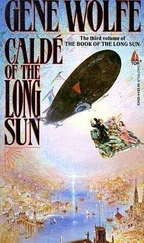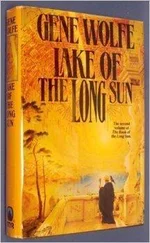Wolfe, Gene - The Best of Gene Wolfe
Здесь есть возможность читать онлайн «Wolfe, Gene - The Best of Gene Wolfe» весь текст электронной книги совершенно бесплатно (целиком полную версию без сокращений). В некоторых случаях можно слушать аудио, скачать через торрент в формате fb2 и присутствует краткое содержание. Жанр: Старинная литература, на английском языке. Описание произведения, (предисловие) а так же отзывы посетителей доступны на портале библиотеки ЛибКат.
- Название:The Best of Gene Wolfe
- Автор:
- Жанр:
- Год:неизвестен
- ISBN:нет данных
- Рейтинг книги:5 / 5. Голосов: 1
-
Избранное:Добавить в избранное
- Отзывы:
-
Ваша оценка:
- 100
- 1
- 2
- 3
- 4
- 5
The Best of Gene Wolfe: краткое содержание, описание и аннотация
Предлагаем к чтению аннотацию, описание, краткое содержание или предисловие (зависит от того, что написал сам автор книги «The Best of Gene Wolfe»). Если вы не нашли необходимую информацию о книге — напишите в комментариях, мы постараемся отыскать её.
The Best of Gene Wolfe — читать онлайн бесплатно полную книгу (весь текст) целиком
Ниже представлен текст книги, разбитый по страницам. Система сохранения места последней прочитанной страницы, позволяет с удобством читать онлайн бесплатно книгу «The Best of Gene Wolfe», без необходимости каждый раз заново искать на чём Вы остановились. Поставьте закладку, и сможете в любой момент перейти на страницу, на которой закончили чтение.
Интервал:
Закладка:
While Mr. Million browsed his way majestically up the helix, David and I raced ahead until we were several full turns in advance and could do what we liked. When I was still quite young it would often occur to me that since my father had written (on the testimony of the lady in pink) a roomful of books, some of them should be here; and I would climb resolutely until I had almost reached the dome, and there rummage. Because the librarians were very lax about reshelving, there seemed always a possibility of finding what I had failed to find before. The shelves towered far above my head, but when I felt myself unobserved I climbed them like ladders, stepping on books when there was no room on the shelves themselves for the square toes of my small brown shoes, and occasionally kicking books to the floor where they remained until our next visit and beyond, evidence of the staff’s reluctance to climb that long, coiled slope.
The upper shelves were, if anything, in worse disorder than those more conveniently located, and one glorious day when I attained the highest of all I found occupying that lofty, dusty position (besides a misplaced astronautics text, The Mile-Long Spaceship , by some German) only a lorn copy of Monday or Tuesday leaning against a book about the assassination of Trotsky, and a crumbling volume of Vernor Vinge’s short stories that owed its presence there, or so I suspect, to some long-dead librarian’s mistaking the faded V. Vinge on the spine for Winge .
I never found any books of my father’s, but I did not regret the long climbs to the top of the dome. If David had come with me, we raced up together, up and down the sloping floor—or peered over the rail at Mr. Million’s slow progress while we debated the feasibility of putting an end to him with one cast of some ponderous work. If David preferred to pursue interests of his own farther down I ascended to the very top where the cap of the dome curved right over my head; and there, from a rusted iron catwalk not much wider than one of the shelves I had been climbing (and I suspect not nearly so strong), opened in turn each of a circle of tiny piercings—piercings in a wall of iron, but so shallow a wall that when I had slid the corroded cover plates out of the way I could thrust my head through and feel myself truly outside, with the wind and the circling birds and the lime-spotted expanse of the dome curving away beneath me.
To the west, since it was taller than the surrounding houses and marked by the orange trees on the roof, I could make out our house. To the south, the masts of the ships in the harbor, and in clear weather—if it was the right time of day—the whitecaps of the tidal race Sainte Anne drew between the peninsulas called First Finger and Thumb. (And once, as I very well recall, while looking south I saw the great geyser of sunlit water when a starcrosser splashed down.) To east and north spread the city proper, the citadel and the grand market and the forests and mountains beyond.
But sooner or later, whether David had accompanied me or gone off on his own, Mr. Million summoned us. Then we were forced to go with him to one of the wings to visit this or that science collection. This meant books for lessons. My father insisted that we learn biology, anatomy, and chemistry thoroughly, and under Mr. Million’s tutelage learn them we did—he never considering a subject mastered until we could discuss every topic mentioned in every book cataloged under the heading. The life sciences were my own favorites, but David preferred languages, literature, and law, for we got a smattering of these as well as anthropology, cybernetics, and psychology.
When he had selected the books that would form our study for the next few days and urged us to choose more for ourselves, Mr. Million would retire with us to some quiet corner of one of the science reading rooms, where there were chairs and a table and room sufficient for him to curl the jointed length of his body or align it against a wall or bookcase in a way that left the aisles clear. To designate the formal beginning of our class he used to begin by calling roll, my own name always coming first.
I would say, “Here,” to show that he had my attention.
“And David.”
“Here.” (David has an illustrated Tales from the Odyssey open on his lap where Mr. Million cannot see it, but he looks at Mr. Million with bright, feigned interest. Sunshine slants down to the table from a high window, and shows the air aswarm with dust.)
“I wonder if either of you noticed the stone implements in the room through which we passed a few moments ago?”
We nod, each hoping the other will speak.
“Were they made on Earth, or here on our own planet?”
This is a trick question, but an easy one. David says, “Neither one. They’re plastic.” And we giggle.
Mr. Million says patiently, “Yes, they’re plastic reproductions, but from where did the originals come?” His face, so similar to my father’s, but which I thought of at this time as belonging only to him, so that it seemed a frightening reversal of nature to see it on a living man instead of his screen, was neither interested, nor angry, nor bored, but coolly remote.
David answers, “From Sainte Anne.” Sainte Anne is the sister planet to our own, revolving with us about a common center as we swing around the sun. “The sign said so, and the aborigines made them—there weren’t any abos here.”
Mr. Million nods, and turns his impalpable face toward me. “Do you feel these stone implements occupied a central place in the lives of their makers? Say no.”
“No.”
“Why not?”
I think frantically, not helped by David, who is kicking my shins under the table. A glimmering comes.
“Talk. Answer at once.”
“It’s obvious, isn’t it?” (Always a good thing to say when you’re not even sure “it” is even possible.) “In the first place, they can’t have been very good tools, so why would the abos have relied on them? You might say they needed those obsidian arrowheads and bone fishhooks for getting food, but that’s not true. They could poison the water with the juices of certain plants, and for primitive people the most effective way to fish is probably with weirs, or with nets of rawhide or vegetable fiber. Just the same way, trapping or driving animals with fire would be more effective than hunting; and anyway stone tools wouldn’t be needed at all for gathering berries and the shoots of edible plants and things like that, which were probably their most important foods—those stone things got in the glass case here because the snares and nets rotted away and they’re all that’s left, so the people that make their living that way pretend they were important.”
“Good. David? Be original, please. Don’t repeat what you’ve just heard.”
David looks up from his book, his blue eyes scornful of both of us. “If you could have asked them, they would have told you that their magic and their religion, the songs they sang, and the traditions of their people were what were important. They killed their sacrificial animals with flails of seashells that cut like razors, and they didn’t let their men father children until they had stood enough fire to cripple them for life. They mated with trees and drowned the children to honor their rivers. That was what was important.”
With no neck, Mr. Million’s face nodded. “Now we will debate the humanity of those aborigines. David negative and first.”
(I kick him, but he has pulled his hard, freckled legs up beneath him, or hidden them behind the legs of his chair, which is cheating.) “Humanity,” he says in his most objectionable voice, “in the history of human thought implies descent from what we may conveniently call Adam , that is, the original Terrestrial stock, and if the two of you don’t see that, you’re idiots.”
Читать дальшеИнтервал:
Закладка:
Похожие книги на «The Best of Gene Wolfe»
Представляем Вашему вниманию похожие книги на «The Best of Gene Wolfe» списком для выбора. Мы отобрали схожую по названию и смыслу литературу в надежде предоставить читателям больше вариантов отыскать новые, интересные, ещё непрочитанные произведения.
Обсуждение, отзывы о книге «The Best of Gene Wolfe» и просто собственные мнения читателей. Оставьте ваши комментарии, напишите, что Вы думаете о произведении, его смысле или главных героях. Укажите что конкретно понравилось, а что нет, и почему Вы так считаете.









